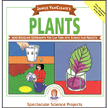How to describe, plan, and implement (carry out) simple experiments that test one variable.
In order to ask well-defined questions, formulate a testable hypotheses, and design an experiment, you need research information. The Hydroponic Investigation for Growing A Sweet Potato in Water provides experimental research. Use this investigation as a control, which is an experiment that the results of other experiments are compared to.
In the Control Experiment for Hydroponics , some of the independent variables are listed below along with well-defined questions.
A Well-Defined Question is one that identifies the independent variable and the dependent variable. The independent variable is the one that you change to determine if it affects the dependent variable. For each of the questions, the dependent variable is the growth rate of the roots and shoots.
1. The firmness of the sweet potato. What effect does the firmness of the potato actually affect the growth rate of the roots and shoots (stems and leaves) of the potato?
Formulate a Testable Hypothesis
Think About It: What would cause the potato to loose its firmness? When fruit, such as peaches ripen they get soft. Ripen is a chemical reaction as a result of aging of the fruit. So, you might make this hypothesis:
Hypothesis:
If softening indicates the potato is old, then the firmer the potato the younger it is and the growth rate of the roots and shoots is more likely to be faster.
What is your hypothesis for the following questions?
2. The end of the potato submerged in water. What effect does the shape of the potato end submerged in water affect the growth rate of the roots and shoots?
3. The type of water used. What effect does the type of water used affect the growth rate of the roots and shoots?
4. The amount of sunlight. What effect does the amount of sunlight exposure affect the growth rate of the roots and shoots?
5. Type of light. What effect does the type of light the plant is exposed to affect the growth rate of the roots and shoots?
Experiment: Use the Control Experiment
The following are things that you are expected to do when doing a science investigation.
* collect information by detailed observations and accurate measuring;
* analyze and interpret information to construct reasonable explanations from direct (observable) and indirect (inferred) evidence;
* demonstrate that repeated investigations may increase the reliability of results;
* construct appropriate simple graphs, tables, maps, and charts using technology, including computers, to organize, examine, and evaluate information;
* communicate valid conclusions in both written and verbal forms;
 |
Janice VanCleave’s Plants: Mind-Boggling Experiments You Can Turn Into Science Fair Projects |